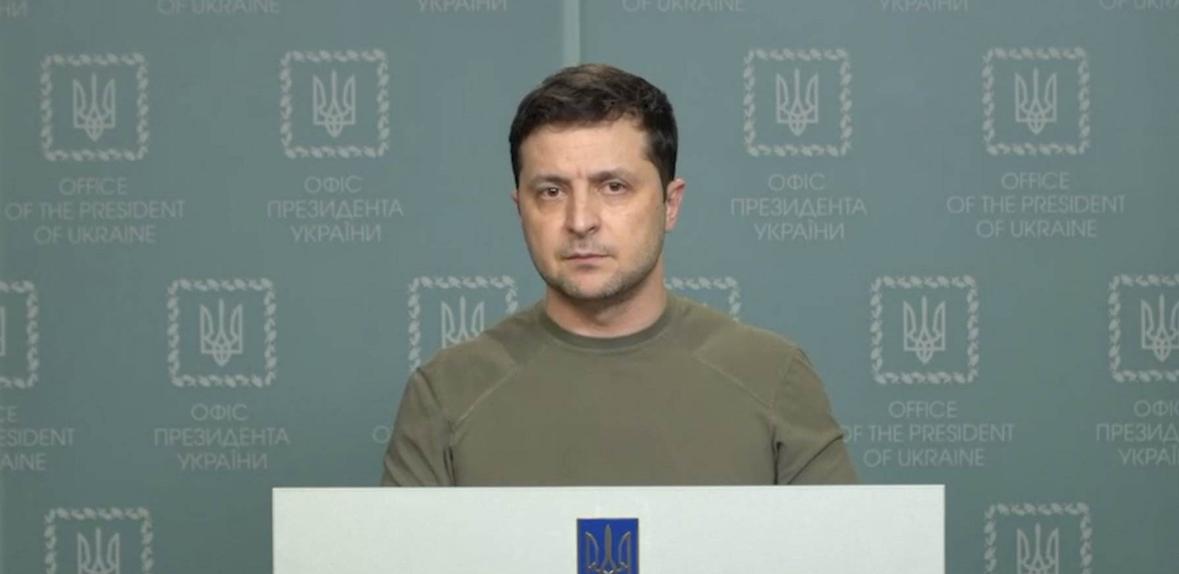At the beginning of the war between Russia and Ukraine, a large performance art exhibition was staged throughout the West, and from the United States to Europe, countries lit up blue and yellow lights to show that "we are with Ukraine" . At the same time, Western sanctions against Russia are extraordinarily intense, from President Putin himself to Russian civilians and even Russian trees.
Seeing that the West supported Ukraine so much, Zelenskiy began to give orders to the West, constantly giving the West sanctions list, and many of Zelenskiy's demands were indeed met. However, the assistance zelenskiy really wanted was delayed.

Zelenskiy hopes to let Ukraine join the European Union, and Western European countries such as Germany and the Netherlands have expressed their hopes to postpone Ukraine's accession to the European Union;
Zelenskiy wanted Ukraine to join NATO, and NATO promised Russia not to accept Ukraine for ten years, and Zelenskiy had to express his loss of interest in joining NATO;
Zelenskiy hoped that the West would provide sufficient armaments and military support, the United States repeatedly insisted that the US military would not engage the Russian army, France arrested "volunteers" who intended to go to Ukraine to participate in the war, and Poland repeatedly quarreled with the United States on the issue of providing warplanes to Ukraine.
Zelenskiy now finally recognizes that the West is not reliable. Zelenskiy complained that the Western promise had been listened to for 13 days, and politicians claimed to provide combat aircraft to Ukraine, but now, where is the West's substantial assistance to Ukraine?
Zelenskiy should have realized that the West was only using Ukraine as a pawn to drag Russia down, and that the West would not be able to accept it if there was a threat of ignition.
Although the West has provided some assistance to Ukraine, in the face of the Russian-Ukrainian conflict, the principle pursued by the West is to watch the fire from the other side, and even whether the Western sanctions against Russia can be sustained have to be marked with a question mark.
Russia has never been willing to be beaten unilaterally, and it is Russia's nature to shoot when it is time to strike, so Russia continues to send counterattacks to the West.
On March 8, local time, Russian President Vladimir Putin signed a presidential decree calling for special economic measures to ensure Russia's security in the field of foreign trade, requiring the federal government to draw up a list of products and raw materials that are prohibited from being exported.
Russia's opening of the "closed country" model is not a good thing for the West. Russia is rich in resources, especially energy and minerals. As we all know, Russia is the world's major oil producer and natural gas supplier, once Russia cuts off the supply of oil and gas to Europe, not only Europe's production and life suffered a major blow, the international energy market will also be seriously disrupted.
Taking natural gas as an example, Europe has intended to abandon "climate security" and switch to "energy security" in order to sanction Russia, however, whether Europe burns coal or firewood, it needs to rely on Russian supplies.
In addition, Russia is the world's third largest supplier of nickel for lithium-ion batteries, and 40% of the world's supply of palladium, a rare metal for chip manufacturing, comes from Russia, which is also a major supplier of titanium. Not to mention, Russia is also the world's second-largest food exporter against the backdrop of clear signs of global food shortages.
It can be said that the Western sanctions against Russia are actually sanctions against themselves, and the countermeasures issued by Russia will only make the situation of the West worse.
However, Russia is not blindly tough, but has shown quite flexibility. Russia fought back while throwing bait at the West.
Recently, Putin released a long list of unfriendly countries and regions, which is also considered a "blacklist" of Russian retaliation. On March 9, local time, Russian presidential spokesman Peskov said that the list of unfriendly russia released by Russia is not dogmatic, but only a guide to action, which can be changed.
That is to say, countries on the unfriendly list can continue to cooperate with Russia as long as they are willing to accept Russia's conditions, and do not have to endure the pain of insisting on meaningless sanctions against Russia.
Of course, the United States and Britain would like Russia to be completely isolated, but for Europe, Russia may not be able to drink soup with the United States and Britain, but will be further controlled by the United States, and Europe has been hurt by the Russian-Ukrainian conflict, with Europe's dependence on Russia in many aspects, continuing to confront will only harm Europe's interests.
Russia is giving Europe a step down at this time, and it is also dividing the camp of allies of the United States. It depends on whether European countries feel that it is important to live a life or to maintain the political correctness of "anti-Russianism".